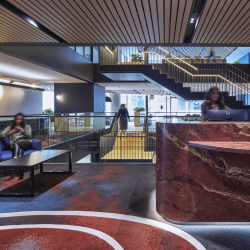February 13, 2023
Childhood’s end for work and the need for a grown-up conversation about it
 Arthur C Clarke’s finest novel Childhood’s End is the story of an Earth that is invaded by a force of alien Overlords. This is not a destructive colonial invasion, which is why there’s no Hollywood blockbuster in the tale, but a seemingly benevolent intervention which ushers in a golden age for humanity. Although humankind initially does not get to meet the Overlords in person (for reasons I won’t give away here), the aliens unite the world’s governments, eradicate crime, conflict and the nation state and do away with the need for creativity and hard work. It is the literal end of history.
Arthur C Clarke’s finest novel Childhood’s End is the story of an Earth that is invaded by a force of alien Overlords. This is not a destructive colonial invasion, which is why there’s no Hollywood blockbuster in the tale, but a seemingly benevolent intervention which ushers in a golden age for humanity. Although humankind initially does not get to meet the Overlords in person (for reasons I won’t give away here), the aliens unite the world’s governments, eradicate crime, conflict and the nation state and do away with the need for creativity and hard work. It is the literal end of history.







 Just what is it that you want to do? People of a certain age will know what answers come next. The rest of you can scroll down to find out. At least two-thirds of those responses still resonate when you ask people want they want from their work and workplaces. They wanna be free to do what they wanna do. And they wanna have a good time. And that’s what they’re gonna do. These are the exact same responses you hear when THE great, existential questions facing the office sector and occupiers are brought up along with those others that follow on from them. What is the office for, how should we design it, what does it do better than other places of work and what do people really want from it?
Just what is it that you want to do? People of a certain age will know what answers come next. The rest of you can scroll down to find out. At least two-thirds of those responses still resonate when you ask people want they want from their work and workplaces. They wanna be free to do what they wanna do. And they wanna have a good time. And that’s what they’re gonna do. These are the exact same responses you hear when THE great, existential questions facing the office sector and occupiers are brought up along with those others that follow on from them. What is the office for, how should we design it, what does it do better than other places of work and what do people really want from it? 


 Bisley is to present its first ever showcase at the Stockholm Furniture Fair (7-11 February 2023), illustrating the multitude of innovative ways in which the brand’s collections can support and enhance home working. Organised in four zones, the stand will focus on key products which tell the story of Bisley’s wide-ranging expertise in designing and manufacturing office furniture solutions, at home and in the workplace.
Bisley is to present its first ever showcase at the Stockholm Furniture Fair (7-11 February 2023), illustrating the multitude of innovative ways in which the brand’s collections can support and enhance home working. Organised in four zones, the stand will focus on key products which tell the story of Bisley’s wide-ranging expertise in designing and manufacturing office furniture solutions, at home and in the workplace. 
 Flexible office provider TOG has announced the opening of its first project built from the ground up – The Black & White Building, located in Shoreditch. The firm claims that The Black & White Building is Central London’s tallest mass timber office, standing at 17.8 metres high and covering 38,315 sq ft. The workspace has been built using renewable materials and innovative construction methods, which
Flexible office provider TOG has announced the opening of its first project built from the ground up – The Black & White Building, located in Shoreditch. The firm claims that The Black & White Building is Central London’s tallest mass timber office, standing at 17.8 metres high and covering 38,315 sq ft. The workspace has been built using renewable materials and innovative construction methods, which 




















December 22, 2022
How businesses can support employee wellbeing over a difficult festive period
by Louise Aston • Comment, Wellbeing